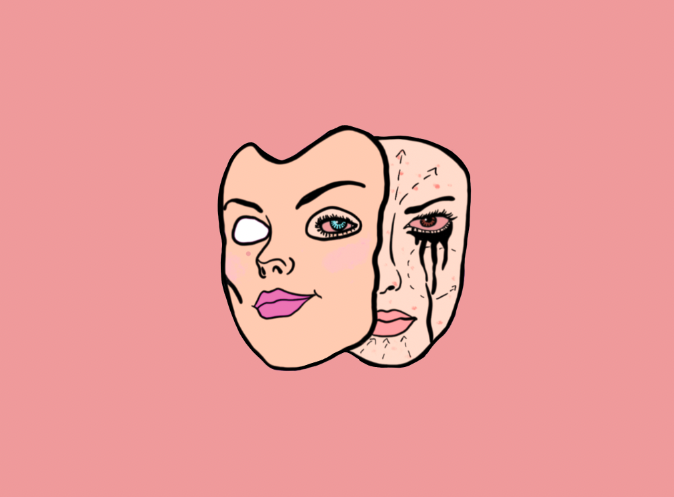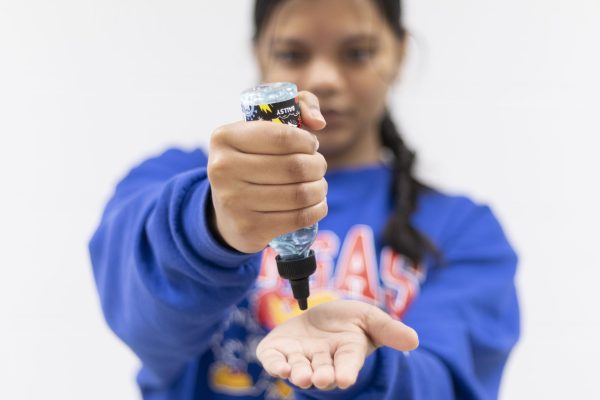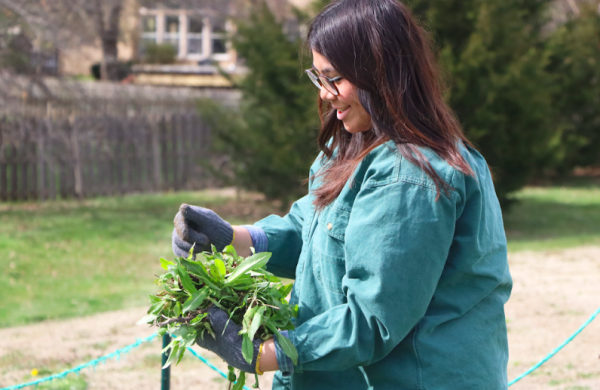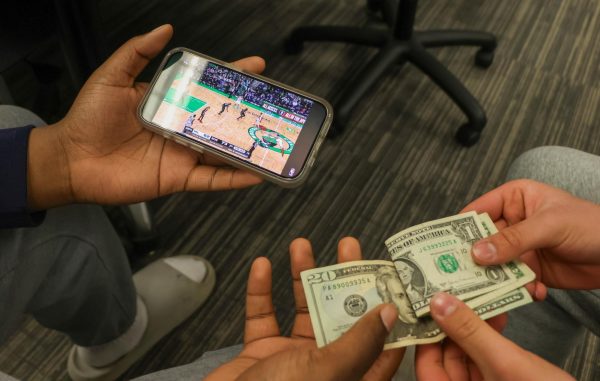Pretty privilege
Teens illustrate the differing treatment they receive from people based upon societal standards.
Digital illustration of a facial plastic surgery transformation.
Sophomore Brooke Zimmer said there was a time when she thought looking like someone else would change her life.
“At the time, I was sort of lonely, and I thought if I looked a certain way that I would have more friends and not feel like I don’t belong or that I don’t matter,” Zimmer said.
Because of the way she looks, Zimmer said she has endured people treating her differently.
“Throughout middle and high school I have felt like my appearance affects how others view me. People have talked behind my back about the way I look,” Zimmer said.
Factors outside of size and weight can have an impact on how people are treated and feel about themselves. Senior Nia Bender said that being a minority presents different treatment as well.
“I think people of color really struggle to find a place where they can fit in because everything nowadays on TikTok and everything [shows] white features,” Bender said. “Other cultures have different beauty standards, but I know having a big nose or having an asymmetrical face is not considered beauty.”
Bender said as a kid, her self-image was negatively impacted due to not looking the same as her peers.
“When I was younger, I was not confident with myself. From first grade to third grade, I was one of the two or three people of color in my class of 15,” Bender said. “I always felt like I stood out in a negative way.”
In our society many people think that a way to fit in is to live up to the beauty standard, but Bender said she disagrees with this.
“Society strongly enforces a beauty standard which is not healthy for us teenagers since all of our bodies are different, which is normal,” Bender said. “People looking different is what makes society beautiful, especially with our unique features.”
Senior Alessandro Navarra said it is a common experience for high schoolers, and even adults, to be treated unequally because of things out of their control.
“I think it happened to everyone, we just don’t know it,” Navarra said. “I know I was treated differently in my school by my peers a couple of years ago because of my appearance, because I was small and short.”
School psychologist Claudine Boldridge said what Navarra experienced is often felt by teens.
“I guess a common thing could be individuals making assumptions about them as an entire human being just based on their appearance. They make assumptions as to who that individual really is as a human being,” Boldridge said.
Although she said she does not think that appearance advantages are real, Boldridge said she thinks there is bias among teens and children. She goes on to explain the brain is where this bias originates.
“The brain is not fully developed until the age of about 25 and the last area of the brain to develop is the frontal lobe,” Boldridge said. “That is the one that helps to make accurate perceptions of what people’s body language is communicating.”
The reason those who do not possess stereotypical features are treated differently, Zimmer said, is because certain beauty standards have become mainstream.
“I think what society considers pretty is being skinny, maybe skin color and a certain facial structure,” Zimmer said. “What I think society considers not pretty is being plus size, having a certain style that is considered different and just not looking like a celebrity in general.”
Zimmer said she believes that people who fit into societal beauty standards are more likely to be given more opportunities than those who do not.
“Studies have also shown that [stereotypically] pretty people have better jobs, wages and other positive outcomes than unattractive people.”
According to the University of Fashion, an online fashion school, some 67 percent of women in the U.S. are above a size 14 in clothes which the industry considers “plus-size.” However just two percent of women shown in media images are plus-size.
Conventionally attractive people can be seen as perfect and having no flaws, according to Bender. Even though pretty people still can struggle with things, she said others tend not to acknowledge that.
“They might have some internal battles that they deal with, but they don’t really acknowledge that and kind of accept that because they are pretty and that is just who they are,” Bender said. “Nothing can be wrong with them.”
Zimmer also said she believes people assume having few physical flaws equates to being a good person.
“I think a lot of people think that prettier people are kind and good people because they look good,” Zimmer said. “That’s not always the case, however, people can be nice or mean regardless of how they look.”
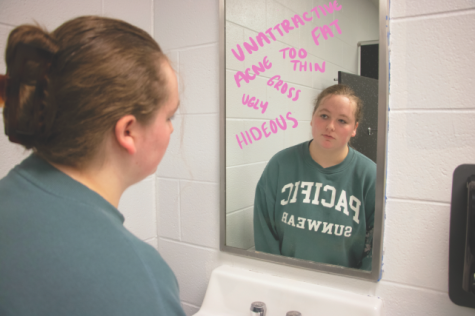
Boldridge explained that she thinks it will likely not change however she hopes this privilege will decrease as time goes on.
“My hope would be that it would decrease because we as a society would learn to recognize that we have or may have to associate all those good qualities with beauty,” Boldridge said.
She goes on to say that the level at which individuals compare themselves now is much higher than it has been in the past due to social media.
“I think that social media is exasperating it because now we live in the world of constant comparison,” She said. “People are so barraged with images that they can just look at on their phones that 10 or 15 years ago did not exist.”
Navarra said he feels appearance does not only affect emotions but also in their success, but not in every case.
“When you work somewhere, you and your appearance advertise yourself and the company you work for unconsciously,” Navarra said. “[However,] Elon Musk wasn’t conventionally attractive yet he was able to become the wealthiest man alive.”
Zimmer explained she feels that although many people still let one’s appearance reflect who they are internally, over time, society has made an effort to become more inclusive as to who they consider beautiful.
“I think that a lot of people know that words really can affect someone negatively,” Zimmer said. “We’ve even seen stories about how bullying and being exclusive can cause mental health problems with people on social media.”
Zimmer said she feels that something individuals should do to counteract these perceptions is keeping an open mind.
“I’d say, ‘Accept that everyone is different and that’s what makes us beautiful.’ Beauty shouldn’t be defined by looking a certain way,” Zimmer said. “We should also just be more open-minded, being different is a good thing.”

Addie Aadland is a junior and writer for “The Express.” This is her second year on staff. Outside of newspaper, Aadland is involved in Quill and Scroll, Team Up for St. Jude, and girl’s basketball. Outside of school, she enjoys hanging out with her friends and family and going on vacation. Aadland also loves working with kids and babysitting. She is hoping to improve the newspaper as the year goes on. Aadland is excited to be a part of the newspaper staff this year at Northwest.

Bridget is a junior and the Social Media Editor of BVNWnews. This is her second year on staff. Outside of newspaper, Bridget is involved in tennis, AVID, NEHS and plans to be a part of NHS this year. Bridget enjoys spending time with friends and family and traveling in her free time. Bridget is excited to take on the roll of Social Media Editor this year.

Norah Alasmar is a senior and the Online Photo Editor for “The Express.” This is her second year on staff. Outside of newspaper, Norah is involved in girls golf, NHS, SNHS and KAY Club. In her free time, she enjoys spending time with her friends and family, and watching her favorite shows and movies. Norah is excited to take on this role, and hopes to improve the photos distributed to our readers.
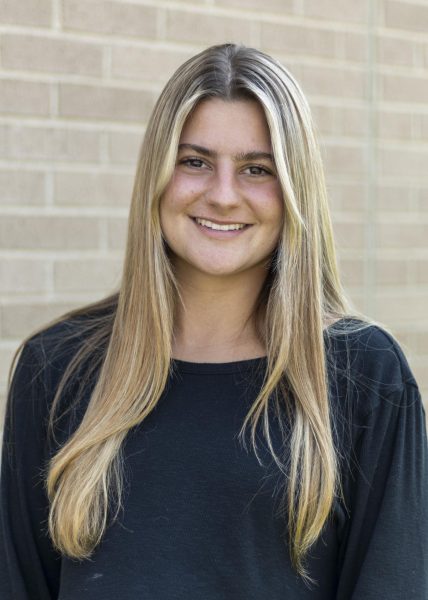
Alex Cowdrey is a senior and Managing Editor for “The Express.” This is her third year on staff as a writer and designer. Outside of newspaper, Alex is involved in Team up for St. Jude’s, NHS, Quill and Scroll, and girl’s soccer. In her free time, she enjoys spending time with friends and family, playing soccer, and being outside. Alex is extremely excited to take on the role of managing editor and cannot wait to see where this year takes us as a staff!



